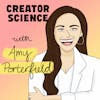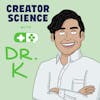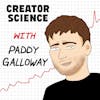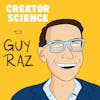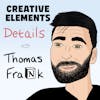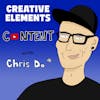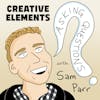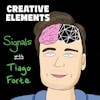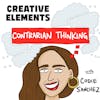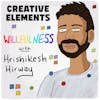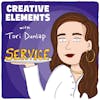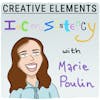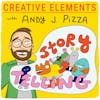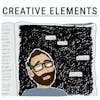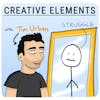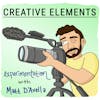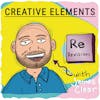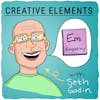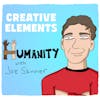
#83: Joe Skinner – How to turn short interviews into structured, high-production podcast episodes
Play EpisodeJoe Skinner is the host and founding producer of American Masters: Creative Spark.
Joe Skinner is the host and founding producer of American Masters: Creative Spark.
American Masters: Creative Spark is a Webby-winning arts and culture podcast that explores what makes a master. Following the model of the signature PBS biography series, American Masters: Creative Spark celebrates diverse artists and cultural icons who represent a wide range of disciplines, from music and comedy to poetry and film.
As Digital Lead for the award-winning national PBS documentary series "American Masters," Joe oversees digital content and strategy for the brand. This includes the production of original digital-forward culture and arts video series', audio series', as well as general content and engagement strategy for the "American Masters" PBS.org website and across all branded social accounts.
In this episode, we talk about Joe’s experience with audio, video, and even photography, how he prepares for interviews, we compare notes on producing a narrative-interview podcast, and Joe explains how good storytelling comes from finding the elements of humanity and common ground with his interview subjects.
Subscribe to American Masters: Creative Spark
Learn more about American Masters
Full transcript and show notes
***
IF YOU LOVE CREATIVE ELEMENTS
Follow Creative Elements on Instagram
Subscribe to weekly episode emails
Leave a review on Apple Podcasts
***
ABOUT JAY CLOUSE
Subscribe to my newsletter, Creative Companion
***
SPONSORS
Get a free 45-day extended trial of Canva Pro
Get a free month of Blinkist Premium
Get 50% off your first three months of Sendinblue's premium account with promo code CREATIVE
***
FOR PODCASTERS
Enroll in my podcasting workshop
Enroll in my course on podcasting, Podcast Like The Pros
***
PODGLOMERATE NETWORK
This show is a part of the Podglomerate network, a company that produces, distributes, and monetizes podcasts. We encourage you to visit the website and sign up for our newsletter for more information about our shows, launches, and events. For more information on how The Podglomerate treats data, please see our Privacy Policy.
Since you're listening to Creative Elements, we'd like to suggest you also try other Podglomerate shows surrounding entrepreneurship, business, and careers like Rocketship.fm and Freelance to Founder.
Learn more about your ad choices. Visit megaphone.fm/adchoices
Joe Skinner 00:00
I just like when a story can unsettle you and make you reconsider the way you're feeling about the world and more so just kind of put you in tune with your emotional self in a way and kind of hit the reset button and get you out of your head a little bit, and into somebody else's.
Jay Clouse 00:17
Welcome to Creative Elements, a show where we talk to your favorite creators and learn what it takes to make a living from your art and creativity. I'm your host, Jay Clouse. Let's start the show. Hello, my friend. Welcome back to another episode of Creative Elements. Big shout out to start the show today to Lynn, Andy and Michelle, who all shared Creative Elements on Instagram last week. It is so surreal to me to see you where you are when you're listening to this show. Lynn shared this amazing photo listening to the show in the countryside of Glasgow, Scotland. And that's just so amazing to me that this show goes from my basement in Columbus, Ohio, and reaches people all over the world. So consider this your open invitation to share your own story of where you're listening to the show and tag me on Instagram. We have an account for the show now @creativeelements.fm. And I'd love to connect with more listeners there. When I was growing up here in Ohio, we didn't have cable. We had an antenna and some basic channels like Fox, CBS, ABC, NBC and PBS. I watched a lot of PBS growing up. But I just never really thought about the fact that PBS is an organization with jobs and a staff that fills those jobs but that is where today's episode starts. I'm speaking with Joe Skinner, the digital lead for American Masters and the host of American Masters: Creative Spark at PBS.
Joe Skinner 01:58
So I actually interned there, way back in 2008, 2009. In an old department they had called the Arts and Culture Department so it wasn't American Masters. I work at Channel 13, which is a at the WNET group, which is a station of PBS so PBS is actually more than just one kind of big company. It's a network of companies.
Jay Clouse 02:24
Joe started his career as an intern at the WNET group on a documentary about artists in Paris called Paris: The Luminous Years. He was a film school student at the New York University Tisch School of the Arts. And after graduating film school, he met a man named Michael Kantor and helped Michael produce a couple of documentaries. Not long after that, Michael Kantor was hired as the executive producer for American Masters at PBS.
Joe Skinner 02:52
So American Masters, the broadcast series has been around since 1986, started by Susan Lacey. It is a documentary series broadcast on PBS and we have about 250 plus different episodes, covering you know, anybody from John Cassavetes to our most recent film was on Helen Keller, and we have a film coming up on Alvin Ailey this January.
Jay Clouse 03:17
So in 2014, shortly after Michael was hired as an executive producer for the American Masters biographical series, he brought Joe in to help.
Joe Skinner 03:25
And what drew me to American Masters was I went to film school at NYU, Tisch, and I was just scrounging around on the internet trying to find anything I could on John Cassavetes, and found the American Masters on John Cassavetes and I just devoured that film. And then, you know, many years later, I was actually already I think it had seeped into my subconscious because I was already working at American Masters. And I was kind of doing a lot of archival work for the series at the time. And I noticed, oh, I forgot about this film. And I guess that really had a big impact on me, and why I ended up here. So yeah, I've just always been drawn to the human stories, people's histories and how they got there, and especially their creative, you know, creative sparks, so to speak.
Jay Clouse 04:13
In 2016, Joe and Michael spun up the American Masters podcast, pulling audio from more than 30 years of long form interviews from that American Masters Film Archive.
Michael Kantor 04:28
Thanks for joining us on the American Masters podcast, where we pull never before heard interviews off the shelf and onto the airwaves. Take a listen to these voices. Recognize any of them?
Nathan Lane 04:41
All of the right people came together at the right time.
Patti Smith 04:45
I mean, I thought it was very cerebrally sensual music.
Quincy Jones 04:49
There's nothing on the planet like that.
Neil Young 04:52
It was a lot of fun.
Joan Rivers 04:53
We still quote that to each other.
Steve Martin 04:57
It's, it's perfect.
Michael Kantor 04:58
Those were snippets of Nathan Lane, Patti Smith, Quincy Jones, Neil Young, Joan Rivers and Steve Martin. Just a few of the hundreds of incredible voices you'll be hearing on the American Masters podcast.
Jay Clouse 05:13
Now in its fifth season, Michael Kantor is still an executive producer for the podcast American Masters: Creative Spark. But Joe has taken over as the host.
Joe Skinner 05:23
I'm Joe Skinner and I'm hosting American Masters: Creative Spark, a podcast that explores what makes a master. Each week, we will share narrative interviews that go in depth with one guest about the creation of a single work. A diverse group of artists and cultural icons will break apart their work piece by piece for M. Night Shyamalan, he unpacks what drove them to make old in the middle of a pandemic. We'll hear from Oscar winning filmmaker Errol Morris, Pulitzer winning poet Jericho Brown, comedian artscow Casca, animator Don Hertzfeldt, and more. Our goal is to investigate the creative process.
Jay Clouse 05:59
And what Joe does on American Masters: Creative Spark is not all that different than what I seek to do here at this show with digital creators. So in this episode, we talk about Joe's experience with audio, video and even photography, how he prepares for interviews, we compare notes on producing a narrative interview podcast and Joe explains how good storytelling comes from finding the elements of humanity, and common ground with his interview subjects. I'd love to hear your thoughts on this episode. As you listen, you can find me on Twitter or Instagram @jayclouse you can tag me or the creativeelements.fm account on Instagram, say hello, let me know that you're listening. And now let's talk with Joe.
Joe Skinner 06:47
You know, certainly, PBS really laid the groundwork for the biographical series I think with this show, and I worked in in the archival department for a long time for the series, I started a digital archive for the series, where you can stream a bunch of raw interviews from past episodes, 1000 different interviews on our website for free, check it out. The cool thing about it is if you are able to look back on some of those old episodes, and a lot of them are not in rights anymore, so you can't stream them. But you can access these old interviews, you can see just how different the approach was, as time passed on. So, you know, doing this work, I watched a lot of different interviewers and engaged with their process, essentially. And you can really see how through the decades, different languages of interviewing really occurred and evolved over time as different expectations changed with the form. I mean, that the documentary form itself, I think, has really changed a lot and evolved a lot over the past several decades, especially as you point out as streaming became, you know, so predominant, and there's a lot to say on that.
Jay Clouse 07:53
Will you open a door a little bit ago that I want to press into even further, which is talking about just like the overall structure of an organization like PBS, I think it'd be really interesting to hear you know, how the breaks out, you mentioned, you're at 13, which is a company underneath the PBS umbrella, it sounds like I would just love for you to give a little bit of background on how that all functions.
Joe Skinner 08:16
So the WNET group, based here in New York, we are in contract with PBS. So for American Masters, we have an agreement to to produce and co-produce and acquire different episodes for the series, and then deliver them to PBS, air on PBS. And PBS then says, you know, this is a national show, this is going to be what they call a hard feed around the country. So all the different local stations pick it up. And it gets these national shows get much larger pickup around the country, versus local shows. And so what's so interesting about the PBS model is that, you know, it is for the public, it's public media. And so there's all these different local stations that have different agendas, because they're serving their local needs. And so really what a show like American Masters has to strive towards, is producing content that can engage with people in New York City and Brooklyn, and wherever you may be just as much as it engages with people in Tennessee, or in the local station in Alabama. And so we actually talk with a lot of those stations all the time and try to figure out ways to make sure we're we're in communication and engaging with them as best we can. I think it's a really beautiful thing. I love that model.
Jay Clouse 09:31
And it's similar to like the NPR model, right?
Joe Skinner 09:34
Yep, exactly. So if you're from the radio world, that's kind of the analog to think about.
Jay Clouse 09:39
Well, here's the thing, like I would paint myself as from the media world, but I'm realizing that I have just no understanding of how organizations like this have been built have functioned or like how they function today, because I've just been raised in such like streaming on demand, you know, pick whatever you want from wherever you want sort of life.
Joe Skinner 10:03
Well, you know, load up the Wikipedia page. It's a deep dive also, um, a film that I deeply love is the the Mr. Rogers documentary, which is not an American Master's film, but it's just an incredible documentary, not just about Mr. Rogers and how amazing he is, but also, a lot of the history of PBS is embedded in his story and how much he fought to make sure it stays alive in Congress and whatnot.
Jay Clouse 10:26
So good. I also love the dark satire, Kidding.
Joe Skinner 10:30
Oh, I haven't seen it.
Jay Clouse 10:32
Oh, you have to. You have to.
Joe Skinner 10:34
Is that based on? Is that riffing on him, from Mr. Rogers?
Jay Clouse 10:38
Yeah, it stars Jim Carrey. And it puts him as like, he's, it's a dark comedy. And it positions him as a Mr. Rogers type character, but the entire series is like the unwinding of this man's psyche. It's crazy, and funny, and dark and fun. Okay, well, you mentioned that you got your degree in film. Tell me about how you got into film in documentaries in the first place.
Joe Skinner 11:06
I fell in love with movies in high school. And it was definitely something where it was kind of a chance for me to see something bigger out then just real life some stories that were outside of my own life and spoke to me. I started you know, going on the internet early internet days and trying to find more and more obscure filmmakers and deeper edges of the medium and just going to my local VHS store and grabbing what I could on the sales rack. And you know, they were actually closing down the store at the time strictly video in Hackettstown, New Jersey. And so I went and I just bought up tons of these 50 cent VHS tapes off the shelves and just started consuming at all. So really cool movies, like, you know, Video Drum had a really cool cover on it. So I made sure to grab that one, tons of stuff. Yeah, so I was always really into fiction, storytelling, independent cinema in particular. And then just decided I really wanted to pursue it, and made movies with friends in high school, and then ended up at school for in New York for for film production. When I was there, I actually kept studying on the fiction track writing and directing. So you know, the way that the film school structured is in the first year, you don't pick up a motion picture camera at all, in the first semester, you work on entirely sound based projects. And then in the second semester, you work entirely on stills, camera, photography based projects. And at the time, we all just thought that was kind of weird and annoying a little bit because we went to film school to make films. But then, you know, the years go on, and I made films for my thesis project senior year, and I'm shooting, I'm 16. And so that was a lot of fun, that was really exciting. But then I just wanted to flag that freshman year, because I would go back to that years later and think, wow, that was interesting, because at the time, we just called them radio dramas. This was before the word podcast really, was popularized or used at all, I mean, maybe Mark Maron show existed at the time, maybe it didn't, I don't know. But nobody was referring to this as podcasting. But we had this class called sound image. In sound image, we were making little radio dramas in Pro Tools. And so I leaned back on that history so much as I kind of ended up where I am now, as set kind of the starting point. And I'm so deeply appreciative of that. And I'm also appreciative of that aspect that was kind of instilled in our heads that all of this stuff is the same. And so there are a lot of connecting tissues between the world of radio, podcasting, and fiction, storytelling, filmmaking, cinema, independent filmmaking, and whatnot, and still photography, and all that stuff. And so I should say, this is a bit of a tangent, I guess. But sophomore year, junior year, senior year, we're also encouraged to find a craft, because it was also told to us over and over again, you know, writing and directing is the main pursuit here, but you're probably not going to find work in that field, or that's going to supplement other aspects of your career at some point. But you should definitely learn a craft. And so I made sure to follow a soundtrack because that excited me. And so I did take a lot of classes on sound mixing, post sound mixing, production sound, sound design, stuff like that.
Jay Clouse 14:41
When you say that video, writing, audio, photos is all the same. What do you mean by that?
Joe Skinner 14:49
Great question. The connective tissue between all these different worlds and mediums is it's all about storytelling, and it's all about trying to evoke a feeling and an emotion from somebody and, and tell a story. And so, in film, I'd be watching, you know, A Woman Under the Influence by John Cassavetes. And that's probably my favorite film of all time, and just being stunned by how little actual plot there might be in the film, but how much story there is in the characters, and in just the drama of this, this kind of human story and human relationships. And so that was very exciting at the time, because it just opened up these doors for me that, you know, you don't even have to necessarily worry about intricate plots. As long as at the core of it, you have a human story, and that there's an essential humanity to the story that you're trying to tell. And so A Woman Under the Influence always spoke to me in that way. And I always try to catch repertoire, screening of it anytime I can for that reason. I just like when a story can unsettle you, and make you reconsider the way you're feeling about the world and more so just kind of put you in tune with your, your emotional self in a way and kind of hit the reset button and get you out of your head a little bit and into somebody else's.
Jay Clouse 16:16
Yeah, I love that, I love when some form of media makes me connect with my own emotions, because I struggled to do it otherwise, a lot of times, you know, like, if I'm feeling some sort of sadness coming on, I'll listen to sad music, because it helps me like lean into it. Sometimes I'll watch a sad movie, like I like to express myself through the themes of a movie. But I'm just thinking the other day, a lot of like our popular movies, I just watched Jungle Cruise with Dwayne, The Rock Johnson. And as we're watching, it's just so obvious to me, where we're going to end up, like the sequence of events in movies like that, and even read notice, which was also in basically the same formula. And yet, they're still popular, we still love them. I don't think there's really anything to do with like human emotion or reconsidering our position. Why do those stories still get our attention?
Joe Skinner 17:13
Hmm, that's a good question. Well, I mean, at the end of the day, people still love a plot. People still love to see, you know, fun. Yeah, I mean, it was just that jungle cruise at Disneyland itself the other the other week, it's just fun. I mean, it's it's a lot of fun. The stand up style jokes that they make as you're going around the Jungle Cruise is really funny. And I watched a clip of The Rock doing that, Dwayne Johnson doing that. And, you know, made me want to see the movie for sure. Yeah, I don't have a super compelling answer to that one, except to say that there are still these kinds of cues, dramatic cues that all audiences all people are really tuned into, when it comes to story. And everyone whether they realize it or not knows what to expect, with a three act structure, for example, they are looking for that seed to be planted, for the inciting incident to happen, that thing that's going to kind of compel them to want to listen to more. And then they still want that sort of rising action and in conflict to pay off in some way by the third act and have that denouement where you kind of finished with some kind of interesting coda. And so whether people are consciously looking for those different beats or not, I think everybody understands it intuitively.
Jay Clouse 18:28
After a quick break, Joe and I talk more about how a three act structure works in storytelling. And later, we compare notes on how he prepares for interviews and produces American Masters: Creative Spark. So stick around and we'll be right back. Welcome back to my conversation with Joe Skinner of American Masters: Creative Spark. Before the break, Joe is just beginning to touch on a very common storytelling technique, the three act structure. If you've ever gone to a play or musical, you'll often literally see the performance separated into three acts in the program. But we haven't really talked about this framework here on the show.
Joe Skinner 19:06
So the three act structure divides a story into three acts, three parts, there's it sets it up with an inciting incident or plant seeds for a confrontation or a conflict. And that second act is really that that confrontation, the rising action, as people call it sometimes. And then yeah, the third act is the resolution, the payoff so if you see it's a podcast. But if you look at me right now, I'm doing a small slope, a graph, like you might see on a stock where it's just going up and up and up. And then at the third act, you see a peak, and then it's going to quickly dip down with a denouement. And that's the three act story structure.
Jay Clouse 19:46
When you're constructing your own stories, whether it's through Creative Spark or any of your own personal projects. Do you follow a three act structure or do you have a different framework that you tend to lean into for storytelling?
Joe Skinner 19:58
I'm not consciously thinking about any kind of structure at all, really, I'm just looking for what, when I'm, when I'm putting together an episode of the podcast, I'm just thinking about what's going to tell the most compelling story. And so it's a little different with documentary than it is with fiction. Because in fiction, you can fabricate that from the beginning. But in documentary, you're thinking about that with many different phases of the process, the first phase being research and preparation for your interview, because the backbone of an episode of American Masters creative spark is based on the interview. And so you need to make sure that the questions you're arriving at, and the overall goal of the interview is well understood before you step into the room with the guest, or step into the squad squad cast session. And so you really want to be thinking about, well, why am I here with this person? You know, what is the most compelling thing they can talk about? And what is what am I going to learn from that thing, and what is going to reveal something about their humanity, and what's going to reveal something about my humanity, and anybody who listens humanity and trying to make that emotion feel universal in some way. And, you know, the cool thing about this is it really resolves itself on its own most of the time, because the people that I interview tend to be storytellers, in some way. And as nervous as I get preparing, and then going into interviews with people that I don't know, the moment you sit down with them, you realize you're in good hands, and they're going to take you on that journey, because they've been thinking about this. And they've been struggling with this idea of three act structure and storytelling, their whole career, too.
Jay Clouse 21:44
We have such a common experience here. I literally, you know, in my episode preparation document in notion, the first thing I have on the page is episode goal, where I define like, here's what I want to get out of this interview, here's why I think I'm here. And my goal for this episode was talking about doing research and guiding conversations with Masters, I just spent the first 20 minutes not really going in that direction. Because as we were talking, you were opening doors I really wanted to go down. So that's like the exciting and scary and frustrating thing about interviews sometimes is I come in with a plan. And then sometimes I just throw it out the window right away, because I see another path to go down. But sometimes I also, you know, want to return to the original path and don't manage my time super well. So I'd love to hear about your process of preparing for the interviews that you do on American Masters.
Joe Skinner 22:36
Sure, yeah. So the podcast has gone into very different directions over time, we're actually in the fifth season of the show, but really the first season in the new format for the show, which is a hard sell and hard to explain, but I'll try my best. So for the first four seasons of the show, we took a really conversational approach to the format. And this, again, was drawn by this desire to look for the humanity in the story, in the guest, but through conversation, rather than through a structured feature approach, your show, you know, being that kind of ladder, that structured feature approach that we've arrived at with this new season in the show. But so I mentioned this because both of those have very different processes when you're preparing, and I think both are interesting, and help you understand each other in a way help to understand each other. So with the conversational format from the first four seasons, all of the effort is really in that beginning research and preparation phase, because you have to make sure you are getting the exact kind of conversation that you really want to go in for. And you always end up with something wildly different. And so that's by design, too, because like you said, some of the most exciting stuff comes out of letting those different paths diverge, and going down the open doors. And so when you're preparing, I try to consume literally everything that I can about the guests, I'll watch all of the stuff they've made as filmmakers, or I'll try to go to see a play they wrote if they're playwrights, if it's not if it's on stage right now, or I'll buy the books and I'll read the books. And then I'll try to watch all of their interviews on YouTube if they have anything. I'll try to listen to as much of the podcasts they've done if they've done any. And so I just like to try to take all of that in as much as I can. And then let that sit and then open the Google Doc and just start thinking of questions, freeform, just questions that would excite me as a listener. And then I'll look through those questions and try to pick apart the questions that sort of start to paint a bit of a structure to the interview.
Jay Clouse 24:48
Let me jump in here. And when you're doing the background research where you're just like consuming all of their work today, any interviews that they've done, what is the story you're telling yourself as to like, when that is done, when you have enough because especially people you're talking to that can be a giant catalogue of their own work of interviews. And I run into this all the time to where it's like, there's no way I can consume all of this. So how do you? When do you feel like, okay, I'll never do it all, I'll never be as prepared as I want but this is enough.
Joe Skinner 25:23
I don't know, I think you just get a feeling for it, I don't think there's a calculated moment of knowing you have enough, I think you just start to really, the person that you're interested in becomes 3D instead of 2D, at a certain point, they start to have a shape and a form. And you start to see between the questions and between the answers on them, you start to see the way that they might think about how they're going to answer something, rather than just the answer they're giving. And so once I can see between the lines, I think that's when I realize I'm ready.
Jay Clouse 25:56
Let me ask you this, do you ever feel like there's a line between being well prepared and being too knowledgeable? I mean, that in two directions, either, like too knowledgeable to let some things be organic in the conversation, or too knowledgeable where it comes off as like weird, how much you know about somebody's story?
Joe Skinner 26:15
No, I personally don't care how the subject thinks about me because I think I'm just supposed to kind of be a conduit, hopefully, to get them into a headspace to open up and be themselves. And I think part of my job is kind of like an actor's job is to, is to not necessarily be myself, but to be be the person that's going to get them into that headspace. And so that means, I believe, you know, there's a lot of different ways that actors prepare for their role. And the way you know, the actor, as the interviewer, you know, there's probably a lot of different ways they could prepare to, and I don't think there's a right or wrong, but way I like to prepare is to have the whole sculpture of the guest by you know, taking in as much of their their stuff that's out there as I can, learning what really sets them off in in in great and interesting ways. And then sort of unlearn it as necessary in the way that I present myself in the way that I, you know, shaped questions for them and go from there.
Jay Clouse 27:13
A little bit earlier, Joe mentioned that there were two ways to frame an interview, a conversational approach and a structured approach. We're still talking about the conversational approach that he in the American Masters Team followed for their first four years of the podcast. And I asked him how he prepares questions for the conversational approach that will pull out the relatable humanity from his guests.
Joe Skinner 27:36
Through the research process, I find that there are certain kinds of questions that are going to get the building blocks of the conversation together. So I'll learn about the project they're working on, for example. And this is just kind of the meat and potatoes of the session. I need to know this about them. We all need to know this about them. But then between those questions, when I'm doing my research, they'll see that they'll they might respond to something a certain way. And then I realized, oh, well, this interviewer on this show I'm researching on, didn't quite go down this avenue enough, because I'm seeing this guest actually wants to talk about some common humanity they might have between the story they're trying to tell themselves or there's a hint of biography in there, that hasn't really been broken open enough. And so that's when I realized, okay, this is where we can get something new and interesting out of the guests. And that's how I know I'll want to go down that path.
Jay Clouse 28:33
I guess I'm ultimately trying to learn how you build rapport and get interesting tape from people who probably do a ton of interviews, and might be a little bit guarded, because you are a stranger, but in your head, like, you know so much about them, they are 3D now. So, real quick, how much time do you usually get with one of these guests? And then how do you build rapport?
Joe Skinner 28:53
I try to get as much time as I can, I'll settle for 60 minutes, but I would love to have that 60 minutes, accidentally extend to 90 or 120. I, in looking at the archived interviews from our series, see interviews that go 8 hours and 9 hours and 10 hours and, and that's where you really start to go down some interesting areas. But so I'll take as long as I can get, but to make them comfortable, I think, I wouldn't say it's an act like I was saying, you know, it's kind of like being an actor and interviewer is, I would say it's a little bit of both. I think there is the act of kind of withholding how much you know, at times, just like you might withhold how much you know, if you, I don't know, go on a date or meet somebody new and maybe you research them online, because we can all do that these days. You might not fully say how much you know exactly. But you still want to be yourself a little bit. And so when I'm interviewing people, I still try to express my own circumstances and express my own shortcomings. Just try to be honest and open in that way to suggest that, hey, you can be honest and open too. And, you know, I work in public media, we're not trying to get some kind of flashy soundbite that we're going to be able to sell, or that we can, you know, make profit off of at your expense as an artist. We're truly interested in what the interviewee has to say, as an artist. And I think knowing they're in the safe hands of public media really helps open people up. And I really try to lean into that, it's something I really respect about the field that I'm in and the company that I work for. And combining that mission statement of American Masters with my own personal mission statement of just valuing the human interaction and the human experience, I think has paid off when I'm able to get compelling moments from guests or have them open up about something that they might not necessarily open up about on a normal press junket.
Jay Clouse 31:00
I have heard somebody that I forget who it was, I wish I give them credit. They kind of describe the stance of assumed rapport, where there's like definitely a line there where if like, you assume too much rapport it comes off kind of weird, like, I don't know, you, you don't know me, we're not friends. But there is a degree of you can come in with a certain stance, and openness and friendliness, and people seem to respond to it. And it's it's definitely a skill that I've honed in interviewing, but I get worried about saying that to people, because I feel like people might take it to the nth degree where it's just too much assumed rapport and it comes off really weird.
Joe Skinner 31:38
Oh, yeah, I know exactly what you mean. And I've definitely done it before. I mean, I say all this stuff. But I've made tons of mistakes in interviewing and I'm still learning. As I go all the time, I think we're all learning constantly as we're doing our craft. But I will also say that having a personal background in the arts, as a filmmaker, as somebody who's studied filmmaking in production has helped a lot. So in interviewing a poet, for example, we might start the conversation out talking about just our own artistic process. And I might open up a little bit about how I might have approached, you know, making a film in a way that I think could correlate to writing a poem. And with this new season in the show, where we've gone away from the conversational format, into the feature format, which is a lot more scripted, I've really been excited to see the overlapping approaches to creative process that happened between all these different disciplines. And like I was saying earlier, you know, the world of the radio drama in sound, and still photography and filmmaking. There's so much overlap like that between all these different disciplines, too, that we cover on the show between poetry and filmmaking, and songwriting, playwriting. And so that's when I'm booking the show is something that I really try to lean into is making sure I'm booking not just a diversity of backgrounds and viewpoints, but also a diversity of disciplines. Because I think seeing that overlap between the different disciplines is fascinating and compelling.
Jay Clouse 33:15
I totally agree. It's made me such a more attentive viewer and consumer of all kinds of media. Because now when I listen to a show, or when I watch a series, I like listen to it as a producer, and I like decide or, you know, project, I should say, why did they make that decision? What was the outcome of it? How could it been done differently? Like I literally watch TV shows, my fiancee, and there'll be like the scene where there's two subjects in the frame. And then something happens in the background by an extra that seems to have no bearing on the whole story. And it's like somebody decided actually that that should be there but why? I love doing stuff like that. When we come back, Joe and I walk through an example episode of American Masters: Creative Spark with M. Night Shyamalan, and how he utilizes a more structured approach to interviewing, right after this. Hey, welcome back. Up to this point, Joe and I were talking about the conversational approach to interviewing. But today now in its fifth season, American Masters: Creative Spark takes a much more structured approach to their show. So I wanted to explore the differences not just in format, but in how he prepares for an interview and how much structuring of the narrative arc he does before he sits down with a guest.
Joe Skinner 34:37
Well, so with the first format, the conversational approach, I found myself really focused on making sure the listener feels like they're in the room with the guests and feels like the segues between topics are natural. There's kind of a rapport, an easy rapport where you kind of hopefully see through the course of the interview the guests kind of open up about what they're interested in talking about, an opening up about themselves, and some sort of humanistic theme in their work. So the pivot to this new approach is still trying to get at that core of approaching a humanistic theme that evokes a strong emotion in the listener and in the guest and in me, hopefully, as the host. The difference is there's less pressure on the segues in the conversation, there's less pressure on carefully trying to orchestrate a conversation, it's more on making sure you get all the different answers that are going to piece together into telling that story in the most compelling way. And so the advantage of that format is many, the advantage of this new format is you can really hone in on a very specific thing, you can really hone in on a specific feeling, specific work of art in the case of our show, and you don't necessarily have to worry about all the different connective tissue that gets you there in the course of your interview. So it gives you a lot more headspace to make sure you're navigating the answers that you want to get on tape, and anything you miss, you'll be able to tie it together later with scripting. And honestly, there's certain things that you don't even really need a guest to say that might be kind of wrote. So in the first four seasons of the show, we would have to spend time with the guest to have them talk about the meat and potatoes. But in this new approach, I'll probably have them cover the meat and potatoes a little bit, the what they're working on. But it's not even essential anymore, because I can just script that. And I can script it in a way that's maybe going to be more compelling to the overall structure than just going through that in the beginning of an interview with somebody would be.
Jay Clouse 36:50
That's something I've learned over the last few months here as well, where I could have you, you know, in your own words, describe American Masters: Creative Spark, or I could introduce that myself in the intro using the plenty of resources available to me, what I find is like sometimes I feel awkward getting a little bit deeper with people off the bat without doing some of the intro stuff because they don't realize that I'm going to do that and that structure into them that might feel like I'm skipping over an important part. So, mental note to myself, I need to do a better job of outlining that context, before we record like, hey, I'm actually going to cover this part in the intro.
Joe Skinner 37:26
I think it's a really good point you brought up, I think that ties not just into making sure we do the best thing we can do with our shows. But I think it also ties into ethics of filmmaking or ethics of documentary ethics of radio, because I actually think it's really important to try to be as upfront as I can with the guest about what I plan to do with their tape. And I've gotten better at trying at sort of setting that up, teeing that up, as the season has gone along, as these episodes have gone along, because I've gotten better understanding what exactly we're trying to do, too. And so now when I go into an interview, I try to fully contextualize that, hey, there's going to be more editing involved in this tape, in this interview than in past seasons. That means that there can be a lot of stuff cleaned up, you know, if you misspeak or say something wrong, we can always just go back and, and say it again, cleaner, if there's like a spoken typo, so to speak. And but it also means you know, we're gonna move around things that help tell the story in a cleaner, smoother way. So there might be an answer to a question around process at the 15 minute mark in an interview, and that answer might have more elaborated upon in minute 55. And we might take something from minute 55 and put it into minute 15 because it's gonna really help tell that part of the story in a complete way. And I think being upfront with them, at the head of the interview about that just makes me feel more comfortable with doing that later when I'm editing because they at least know when they're going through the interview, that that's part of the process.
Jay Clouse 39:04
So let's let's zoom in on an example here from the show you interviewed M. Night Shyamalan about his new film, Old.
Joe Skinner 39:13
Night just came off a string of three successful films with a visit split and glass. Movies that many saw as a return to form, he'd really started to hit the ground running, but maybe a little too fast.
- Night Shyamalan 39:25
All those amazing good habits start to erode as you start to become successful, and you have no time to do those good habits. So I was aware of going hey, let's stop this up and down thing and take the pause. Where are we? What do I feel hollow about? What do I even want to achieve at this point? There's something beautiful about that and just sitting and letting ideas connect and who you are start to be more in alignment with things you're doing.
Joe Skinner 39:55
So he got to work on making his next film, Old and it was born in this time span workshopping on the themes of aging and mortality. Ideas especially resonant in a post pandemic mill you.
40:09
What happened to? The body has decomposed. How quickly can that happen? Seven years. But she just died?
Jay Clouse 40:24
When you started that interview, what did you have in hand? And what were you trying to get from that interview on tape.
Joe Skinner 40:33
So what I had on hand was, I had watched the film, first of all, and so I should rewind for a second here and say that this new season is really about breaking down a single work of art in each episode. So with that in mind, it also makes research a little more focused because we know exactly what we want, we want to break down his new film Old. So I watch the film and then I revisit other films of his that I've seen already that I think will have tangential connections to how he's building that film and telling that story. So I'll look at signs which makes an appearance in the episode, I'll look at the Sixth Sense, which is so formative to his career. And I'll read about the kind of ways he was talking about craft back then, versus how he talks about craft now. And I'm really interested in what I learned during that process of seeing how he seems to have opened up more over time towards his family life and towards the personal in ways that he wasn't necessarily doing early career, you know, he started out as a really young filmmaker and hit it really big. In his 20s, he was 29, when he made the Sixth Sense, which is insane. At the time, think about what you're doing when you're 29, making movies or making art, it's you're thinking about things in a very different way. And so now, it's fascinating to see that evolution through research, that he's so much more open to talking about family life, talking about how the personal hasn't influenced him. And so I see that, you know, his daughter, for example, had worked on Old in some capacity. And he talks about bringing his family to the premiere, or not being able to bring his family to the premiere. And so I knew that that could really be the crux of sort of an emotional core to the piece. And so that's going into the interview, what I had a suspicion might end up happening. And I think that's kind of where we end up going and hopefully discovering a little bit and folding that into just the nuts and bolts process of how he made Old is how not just the nuts and bolts of how you get through COVID protocols as one of the first studio films to really do it in the height of the pandemic, but also how he approached it as a family man, how he thought of his crew, as a family, and how that influenced the way that he builds out his film sets. And I think there's kind of an emotional core to that part of his process that I wanted to get into.
Jay Clouse 43:01
I asked because you know, I hear the the voiceover you do, the narration in between questions. And I wonder how much of any of that is prepared like are those beats and those shifts prepared ahead of time, versus kind of reverse engineered based on the tape that you get.
Joe Skinner 43:16
A little bit of both. It's the scripted voice over is prepared ahead of time, in the sense that I do have a general arc in mind for where I want to take the interview. But on 90% of the time, getting a different interview than what I thought I was going to get. Or I'll discover in the process of reviewing the interview or while I'm sitting there, hopefully, I'll discover that there's something more fascinating than what I thought I was going to get during my research. So oftentimes, if you if I'm in bringing my A game as an interviewer that day, which I hopefully every time, you'll pivot during the interview, when you realize oh, actually, this thing he's saying is what's most fascinating to me. And if it's most fascinating to me, it's probably going to be most fascinating to the audience as well. And so during this interview, I realized that the way he's talking about this moment in time making Old in the course of the pandemic, and the way he talks about the influences that drew him to filmmaking in the first place, Steven Spielberg, some of these really cool Australian New Wave films, the way he's talking about this stuff to me right now. It relates to this scene from the film that really stood out to me about building sandcastles and how those sandcastles are just going to be washed away in the water. And what we can really do is just enjoy the moment of building the sandcastle even though we know it's going to just wash away and so I realized during the interview that that was going to kind of be the crux for me of this episode. And one of the most compelling moments in Old, two of the main characters stop battling against the ravages of time. They take pause, and engage in one of the most apt metaphors for both the tragedy and the joy of life and the creative process.
- Night Shyamalan 45:16
There's a certain point of the movie when they make a sandcastle, and that's really when this intense relentless thriller gets shattered, making a castle out of sand is so powerful. The impermanence of it, you're spending all this love and energy it's just getting washed away when the high tide comes is so beautiful. And essentially, it's kind of like secret sauce, when you return to being a kid, and find value in play, and just do something as meaningless as making a castle in the sand that's about to get washed away. When you decide that that's important, you actually unlock something.
Joe Skinner 46:01
I didn't think in my preparation, that the episode would end, for example, on talking about those sandcastles. But as I went through the interview, I realized I need to get him to talk about that scene, because that scene covers everything. And it covers all the episodes I've done up to this point, too. Because to me, what I really love about art is that we're all kind of just building sandcastles. And we're not doing brain surgery. I'm not saving somebody's life with a podcast episode, the ways brain surgeon might. But we're all building the sandcastles, and they're going to wash away. And honestly, that can extend beyond just start to. And I think it just helps you realize the why of why it can be compelling and important to listen, to process because when you break away the end result because it's in the ocean washed away, all you're left with is process. And so it felt like a mini thesis, for the season of this show the new approach we have for this show right there in the episode. And so it's kind of like, oh, bingo, there's the there's the light bulb. There's the aha moment for me during that interview. And then the end result of that light bulb firing off in my head is just a very simple question to the guests. I mean, a night, can you tell me about my favorite scene from the movie when your characters are building sandcastles. And so at the time, it might seem in the interview, like the meat and potatoes, because he's just you know, describing a scene. But it ends up kind of tying together I think everything that was interesting about his interview and him as a person.
Jay Clouse 47:42
This visual of the sandcastle washing away, can be so confronting an existential to somebody listening to this. Wait, the thing that I'm making and putting so much work and effort into like, ultimately may go away and not matter. You mentioned process being kind of the lesson there. You've also talked about craft quite a bit, which to me, like those are very similar ideas. But to wrap this up, can you just share a little bit about how you think about and approach graft?
Joe Skinner 48:10
I try to approach everything much like the sandcastles that night talks about, I think, as long as you are, you are putting everything you can into that craft, into that process, the end result, it doesn't even really matter what the end result is, because that effort that you put into the process will show through in some way. And I think this new approach for the show, really lets you put as much as you possibly can into the craft of it more so than before. And so it's exciting to me that I can take that fundamental idea, I have philosophy, I have around life, and dive headfirst into that with making the show before when it was a conversational show. You get the tape from the interview, you do some cleanup to the edit and all that but then you're mostly done. But here, there's an infinite number of things you can do with the episode after the interviews been done before you release it. And so for me, it's exciting to just dive into that headfirst, and do as much as I can, in that part of the process. And I get excited about wearing all the different hats doing that. So I love to see how the story unfolds each step of the way, from when I get the interview, to when I script it out, get a transcription of it and start moving around the different pieces of the interview in my edit, and then I start scripting the voice over to go with it and I discover something new. And then I start to actually bring that audio into Pro Tools and edit everything together to tell a story and I'm excited to see something new I hear about it because before, I'm seeing all the answers on the written page, now I'm hearing it with my voiceover. And I realize, oh, the way they're talking about this, in the sound of it is informing something new for me so I'll move things around. And then layering in music, and sound effects starts to excite me in different ways to because you're finding emotions in the answers that might, you might not have realized were there before. And you're finding a rhythm to the piece that might not have been there before. And then finally, mastering it and mixing it is exciting too, because you're, you're hearing the way you're just hearing it polished off, you're hearing it shine in the best way possible. And so just that whole arc to the making of an episode like this is very similar to me to the arc of making a film, and the arc that I heard from many of the guests about how they, they make all their work and, and I just love, I love that process. And I love the way you learn things about yourself and the way you learn things about other people in the course of those kinds of processes. And so I think the goal with the show is to hopefully, have a listener, experienced that same kind of excitement that I get, making the show and going through that process by hearing other people who are much more notable than me and have much more storied careers than me, go through that same process for them and explain it to them. And really kind of draw them into that, that moment, so they can enjoy the sandcastle building as well.
Jay Clouse 51:37
There were parts of this interview where it almost felt like I was talking to myself, Joe and I have a lot in common in how we approach these shows. But I think I can learn a lot from Joe's subjectivity. There were some points in this interview where he pointed out that he is just a conduit for the story he's trying to tell, and he doesn't care what the interview subjects think of him. I wonder how that would change the way I approached this show. If I was more focused on getting great tape and telling the right story without worrying about all of my own relationships with the guest. And I loved his point about audio, video, photography, all of it being the same. It's easy to get more caught up in the medium when we should be more focused on the message. Season five of American Masters: Creative Spark is completely out now and available for you to listen to just search American Masters in your podcast player or visit the link in the show notes. I listen to most of the episodes from season five myself at this point, and they really are great. Thanks to Joe for being on the show. Thank you to Emily Clouse for making the artwork for this episode. Thanks to Nathan Todhunter for mixing the show and Brian Skeel for creating our music. If you'd like this episode, you can tweet @jayclouse and let me know or tag me @creativeelements.fm on Instagram. If you really want to say thank you. Please leave a review on Apple podcasts. Thanks for listening and we'll talk to you next week.
Most Popular Episodes
New to the show? Check out some of our most popular episodes.






